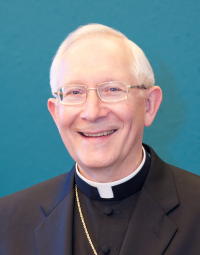
Archbishop Leonard P. Blair
Soon, the season of goodwill and peace on earth will be upon us, and it will be celebrated at many levels, some profoundly religious, and some not religious at all. I’d like to propose something simple. Each of us sets aside 15 minutes of complete peace and quiet before Dec. 25 to reflect on the meaning of Christmas. I have to warn you that there’s a catch to my proposal. People are often asked what something “means to them.” That’s fine for what it’s worth. My question does not exclude a personal answer, but what I propose is something different, namely, what is Christmas — not just for me, not just here and now — but for the world and for every person through all of history.
The “goodwill and peace on earth” of Christmas is often taken to mean a world without hatred, war or injustice. I would be a grinch to belittle this, and a heretic to dismiss it, but there is still something missing. Many movements and ideologies throughout history have promised (and have failed to deliver) a happy world.
What is Christmas? Christmas is not just about earth; it’s also about heaven. Christmas is not just about man; it’s also about God. Indeed, with the birth of Christ, the Church proclaims that “heaven is wedded to earth,” and that righteousness has looked down from heaven. There’s a lot more to Christmas than feelings of good cheer and human wishful thinking about a better world. Hopefully, a 15-minute meditation will take us much deeper.
Please consider as food for thought the following from the Catechism of the Catholic Church:
WHY DID THE WORD BECOME FLESH?
457 The Word became flesh for us in order to save us by reconciling us with God, who “loved us and sent his Son to be the expiation for our sins.”
458 The Word became flesh so that thus we might know God’s love: “For God so loved the world that he gave his only Son, that whoever believes in him should not perish but have eternal life.”
459 The Word became flesh to be our model of holiness: “Take my yoke upon you, and learn from me.” Jesus is the model for the beatitudes and the norm of the new law: “Love one another as I have loved you.” This love implies an effective offering of oneself, after his example.
460 The Word became flesh to make us “partakers of the divine nature”: “(S)o that man, by entering into communion with the Word and thus receiving divine sonship, might become a son of God.”
In order for these four truths about Christmas to come alive, we have not only to know and believe them, but also to live them, to live by them. This is exactly what saints do. And that should be the real hope of our 15-minute meditation, hopefully the first of many meditations: that we will allow ourselves to be transformed by all that God intends for us and the world as a result of Christ’s birth. How much the world today needs our witness to the reality of Christmas! May God bless us, our archdiocese, our communities and all peoples with the truth and love born at Bethlehem on the first Christmas night. And may he grant you and your loved ones a holy Christmas and Happy New Year.
